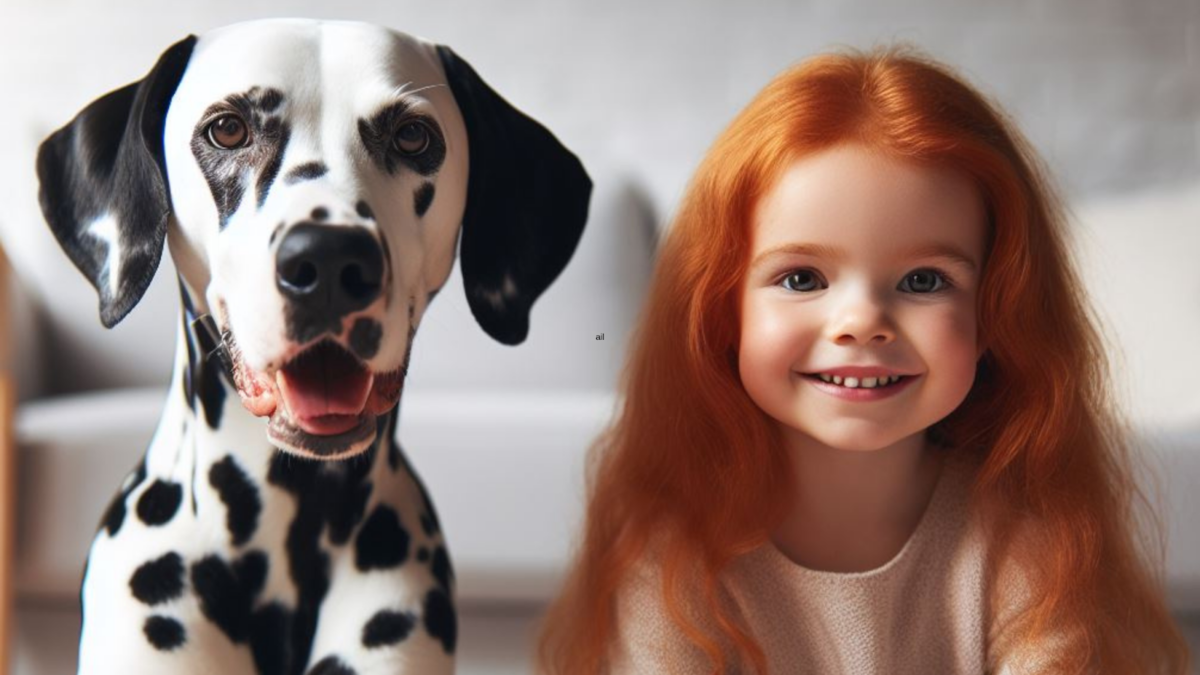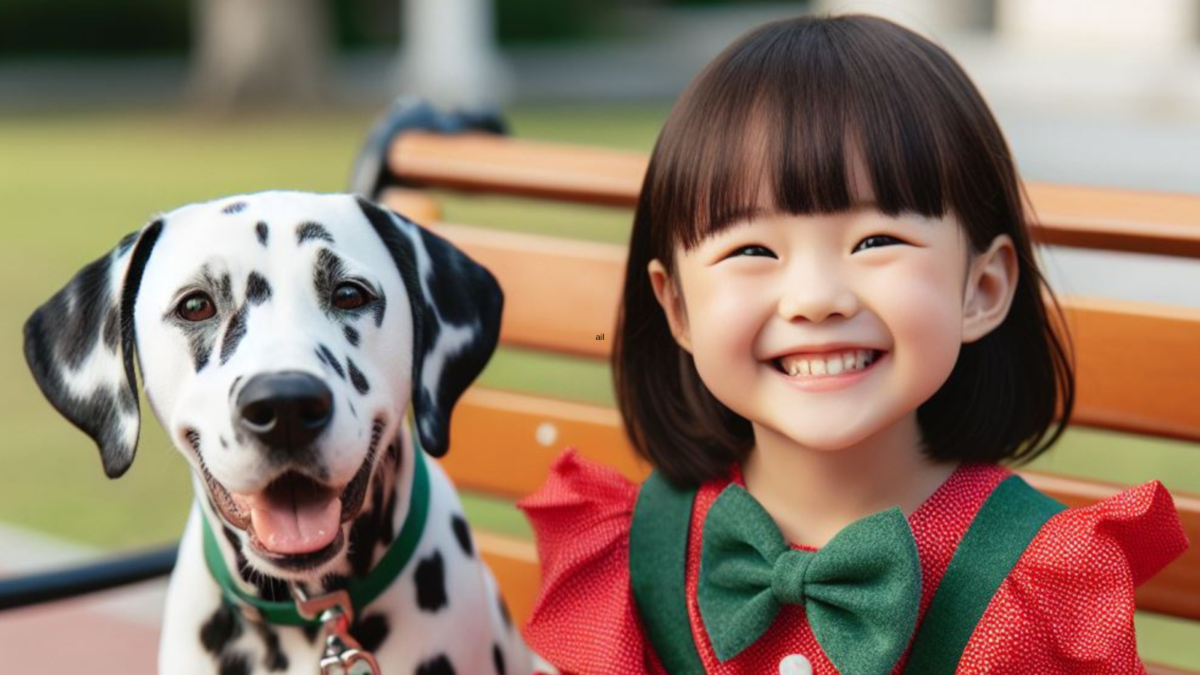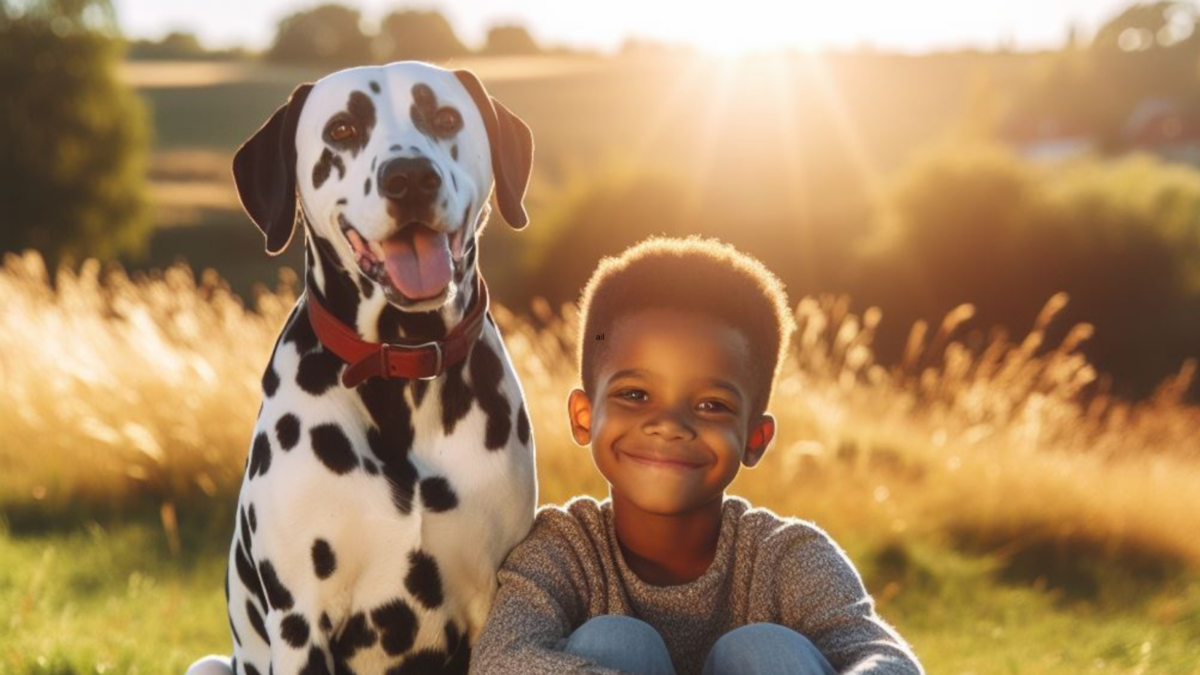When considering a family-friendly dog breed, you might find yourself picturing the distinctive spots of a Dalmatian. Known for their unique appearance, Dalmatians have gained a reputation as an emblematic firehouse mascot and a beloved character in children’s literature. But beyond their charming spots, it’s crucial to ask if Dalmatians are a good match for families with children.
Dalmatians are medium-sized, muscular dogs with high energy levels and a playful nature that can mesh well with the liveliness of kids. However, their energetic disposition means they require plenty of exercise and mental stimulation. Proper socialization and training are essential to ensure that the dog’s interactions with children are positive and safe. To really dive into this question, we need to look at expert sources like Dr. Karen Overall who worked on “How anticipating relationships between dogs and children can prevent disasters.”
So, Are Dalmatians Good With Kids?
Dalmatians can be good with kids, especially when socialized early and properly. They’re energetic and playful, making them great companions for active children. However, their size and energy level require supervision around younger kids. Proper training and consistent boundaries are crucial for ensuring positive interactions between Dalmatians and children.
When you’re considering a family dog, it’s important to know if the breed you’re interested in is kid-friendly. So, let’s talk about Dalmatians. These spotted dogs are known for their energy and playfulness, which can be a great match for active children.
Temperament
Dalmatians are highly social and tend to have a friendly nature. They’re often patient and loyal, which are nice traits for a family pet. However, like all dogs, they need proper socialization. Introduce your Dalmatian to different people and situations when they’re young to help them become more comfortable and well-behaved around kids.
Energy Level
These dogs have a lot of stamina and enjoy being busy. They require regular exercise to manage their energy levels. If your kids love to run around and play, a Dalmatian might be the perfect companion to their adventures.
- Exercise Needed:
- Long walks
- Interactive playtimes
- Space to run around
Size and Strength
Remember that Dalmatians are medium to large dogs. Their size and exuberance might be overwhelming for very small children. It’s essential to teach your kids how to interact safely with a bigger dog to prevent accidental injuries.
Training
Dalmatians are intelligent and respond well to training. Teach your Dalmatian basic commands and rules of the house. Your kids can be involved in this process, helping to strengthen the bond between them and their pet.
Considerations
Every dog is an individual, and while Dalmatians can be fantastic with children, their suitability also depends on their own personality. It’s crucial to supervise interactions between kids and dogs to ensure safety for both.
In your research, be sure to look at real-life stories of families and their Dalmatians to get a better understanding of what to expect with this distinctive breed.
Dalmatian And Children Overview

When you’re considering a Dalmatian as a pet and you have kids, it’s important to know that Dalmatians are energetic dogs that can be a great match for families. They’re highly recognizable, thanks in part to the movie 101 Dalmatians, and often associated with firehouses where they’ve been mascots.
Small Children Versus Older Children
Dalmatians have a robust build and a lot of energy, which means they might accidentally knock over smaller children during play. Older kids are better suited to match a Dalmatian’s high energy and playfulness. You’ll want to supervise their interactions until you’re confident that your dog understands how to be gentle.
Teaching Children How To Interact With Dogs
It’s crucial to teach your children the right way to interact with any dog, especially one as spirited as a Dalmatian. Show them how to approach the dog calmly, avoiding rough play or startling the dog. It’s also a good practice to educate them on the importance of not disturbing the dog while it’s eating or sleeping.
Fun Activities For Dalmatians & Kids
Dalmatians and kids can enjoy a variety of activities together. From fetch to running around in the yard, these dogs love to be active, and engaging in these activities can help burn off their excess energy. Additionally, Dalmatians can be trained for agility courses, which can be a fun family activity to participate in or watch.
Temperament and Personality
When considering a Dalmatian as a family pet, it’s important to understand their typical temperament and personality traits, as these dogs are known for being loyal and energetic.
General Temperament
Dalmatians are playful and energetic dogs known for their high spirits and love of activity. They’re often described as affectionate with their families, making them potentially good companions for children who can match their energy levels. However, some Dalmatians may have a more aloof personality, so while they are loyal to their family, they might not seek constant affection.
Every Dog is Different: Why Some Dalmatians are better with Kids Than Others
Not all Dalmatians will have the same degree of patience or tolerance for the rough play that can come with kids. Here are a few reasons why:
- Individual Personality: Just like people, each Dalmatian has its own unique personality; some may be naturally more gentle and patient with kids, and some dogs are more prone to know how to help a sad kid, while others may be less interested.
- Background: A Dalmatian’s previous experiences can shape how they interact with children. A positive history can lead to better child compatibility.
Socialization Needs
Proper socialization is key for Dalmatians, especially if you want them to get along well with children. They are sensitive by nature, which means early, consistent, and positive interactions with a variety of people, places, and situations can help them develop into well-rounded adult dogs. Here’s what you need to consider:
- Consistency: Frequent, regular exposure to kids and various scenarios can make a Dalmatian more comfortable and less aloof around children.
- Positive Reinforcement: Rewarding your Dalmatian for good behavior with kids will reinforce their affectionate traits.
By understanding these aspects of a Dalmatian’s temperament and personality, and recognizing that each dog is an individual, you can better assess whether a Dalmatian will be a good fit for your family and lifestyle.
Living with a Dalmatian

When you bring a Dalmatian into your home, you’re welcoming a high-energy dog who thrives on exercise and is known for intelligence. They require ample space to play and consistent training to be their best selves.
Exercise and Energy Levels
Your Dalmatian will have lots of energy. Daily exercise isn’t just recommended; it’s a must. Plan for at least two 30-minute walks every day. Active play sessions and runs are also great ways to keep their energy level in check. Regular exercise can prevent restlessness and behavior issues.
Space and Living Environment
Dalmatians need space to move and stretch their legs. A big yard is ideal but, if you live in an apartment, daily visits to the park work too. Just make sure wherever you live, you have enough room for them to play and explore safely.
Training and Intelligence
Dalmatians are smart and learn quickly, which makes obedience training a smoother process than with some breeds. Always use positive reinforcement and be consistent with your commands. They respond well to challenges, so training should include a variety of tasks to keep them engaged and happy. Regular mental stimulation is as important as physical exercise to keep your Dalmatian’s sharp intelligence in top form.
Interaction with Children
When bringing a Dalmatian into your home, it’s important to understand how this breed interacts with kids. Dalmatians can be wonderful family dogs with a playful nature, but they require proper socialization and training to ensure a positive relationship with all family members.
Building a Positive Relationship
You’ll want to create a bond between your Dalmatian and your kids from the start. Puppies can be especially high-strung and energetic, so teaching your kids to approach them with patience and respect is crucial. For a Dalmatian, forming a positive relationship with kids involves gentle play and consistent, positive interactions that reinforce good behavior.
- Examples for Building Positive Relationships:
| Age Group | Interaction Type | Description |
| Babies | Calm and Supervised | Allow puppy to gently sniff and observe. |
| Toddlers | Guided and Gentle | Teach gentle petting and simple commands. |
| Older Kids | Play and Teach | Involve in training and play fetch or run. |
Setting Boundaries and Safety
For both the safety of your Dalmatian and your children, boundaries are key. Teach your children not to disturb the dog while it’s eating or sleeping to avoid any misplaced nipping or growling. Make sure your children understand that even though Dalmatians can be great playmates, they should always treat the dog with kindness and not as a toy.
- Safety Tips:
- No pulling on ears or tail.
- Always supervise interaction with babies or younger kids.
- Educate kids on understanding a dog’s body language.
Energy and Play Considerations
Dalmatians are known for their energy and playful nature. They are often well-suited for families with older kids who can match their energy levels in play. It’s important to consider if your family can provide enough exercise and engagement to meet a Dalmatian’s needs. An understimulated Dalmatian might become restless or unintentionally rough during play.
- Energy Management Strategies:
- Regular walks or runs.
- Scheduled playtime.
- Interactive toys to keep them mentally engaged.
Proper Care for Dalmatians
When you bring a Dalmatian into your family, knowing how to properly care for them is key. They require a balanced diet, regular grooming to manage shedding, and plenty of exercise to keep them healthy and happy.
Nutrition and Diet
Your Dalmatian needs high-quality dog food that’s rich in nutrients. It’s important to monitor their food intake to prevent obesity, which can be a health concern for this breed. You might want to feed them measured amounts twice a day instead of leaving food out all the time. For treats, go for healthy options like bits of carrot or apple, but remember, treats should only make up about 10% of your dog’s daily calories.
Grooming and Shedding
Dalmatians are known for their beautiful spotted coats, but they also tend to shed a lot. You’ll need to brush them at least two to three times a week to remove loose hairs and keep their coat shiny. This not only helps to manage the shedding, but it’s also a good way to give your Dalmatian some attention and bonding time.
Exercise Needs
Exercise is super important for your Dalmatian. They were bred to run for miles alongside carriages, so they’ve got lots of energy to burn! Aim for at least two 30-minute exercising sessions each day. This can include walks, jogs, or playtime at the park. It’s not just about keeping their weight in check – Dalmatians also need to satisfy their need for mental stimulation and physical exercise to prevent boredom and destructive behavior.
Potential Challenges
When considering a Dalmatian as a family pet, it’s important for you to recognize some challenges that might come up. These dogs can be a great addition to your home, but they do have certain traits that require attention and understanding.
Dealing with Aggression
Dalmatians can sometimes show aggressive behavior, which might surprise you since they’re often known for their friendly nature. This aggression can happen when they’re in pain or scared, or if they haven’t been properly socialized. It’s crucial for you to be aware that a Dalmatian might snap if it feels threatened, so teaching kids how to interact safely with the dog is key.
Tips to Handle Aggression:
- Regular training sessions to encourage good behavior
- Socialize your Dalmatian from a young age with various people and environments
- Consult a professional if you notice signs of aggression
Preventing Destructive Behaviors
If Dalmatians get bored or aren’t exercised enough, they can become quite rambunctious and may resort to digging or other destructive behaviors. This can be a lot for you to handle, especially if you have a yard they can turn into a maze of holes.
How to Prevent Destruction:
- Keep your Dalmatian active with daily exercise
- Invest in chew toys and puzzles to keep their mind busy
- Establish and stick to a routine to prevent anxiety
Health and Genetic Issues
Health-wise, you need to be prepared for some genetic issues that are common in Dalmatians. Bladder stones can be a real pain for both you and your pet, potentially leading to blood in the urine and discomfort. If you aren’t ready to deal with these health challenges, a Dalmatian might not be the best fit for your family.
Health Challenges:
- Regular vet check-ups to monitor for signs of bladder stones or other health issues
- Providing a diet formulated to support a Dalmatian’s urinary health
By keeping these potential challenges in mind and being proactive in managing them, you can help ensure that your Dalmatian is a happy, healthy family member.
Choosing the Right Dalmatian
When considering a Dalmatian as a family pet, it’s critical to start with the right one. Your ideal companion should come from a caring environment and have early socialization to ensure they’re good with kids.
Working with Breeders
Initiate your search for a Dalmatian by contacting reputable breeders. These breeders often register with organizations like the American Kennel Club (AKC) and are committed to the health and well-being of their dogs. A responsible breeder will:
- Encourage you to visit and see the conditions in which their Dalmatians are raised.
- Be transparent about the puppy’s medical history and lineage.
- Discuss how they socialize their puppies.
Assessing Dalmatian Puppies
When you’re looking at a Dalmatian puppy, observe how it interacts with its siblings and with you. A well-socialized puppy will be curious and playful, without showing signs of undue aggression or fear. Consider the following:
- Temperament: Look for a puppy with a calm yet playful disposition.
- Environment: Ensure puppies have been raised in a clean, safe, and loving environment.
Assessing Older Dog With Kids When Adopting A Dalmatian
If you’re considering an older Dalmatian, it’s important to assess their interaction with children. Work with a reputable Dalmatian rescue to find a dog that fits your family. A dog that has been properly socialized will be more likely to integrate smoothly into your family. You should:
- Observe the dog with kids in different scenarios to gauge its reactions.
- Ask if the Dalmatian has lived with or been around children before.
Frequently Asked Questions (FAQs)
When it comes to Dalmatians and kids, you might have some questions. Here’s what you need to know.
How do Dalmatians typically behave around children?
Dalmatians can be friendly and playful companions for children. They often form strong bonds with family members and can be protective.
Can a Dalmatian be a good pet for a family with kids?
Yes, with proper training and socialization, Dalmatians can be great pets for families. They’re typically energetic and love to play, which can be a good match for active children.
What should families consider before getting a Dalmatian if they have children?
Before adopting a Dalmatian, consider their high energy levels and need for regular exercise. Also, think about the time and patience required to train and socialize a large, active dog.
How can you train a Dalmatian to be gentle with children?
Consistent training and early socialization are key. Teach your Dalmatian commands like “gentle” when interacting with children and reward calm behavior.
Are there specific activities that Dalmatians enjoy doing with kids?
Dalmatians typically love games that involve running and fetching. They’ll enjoy activities like playing fetch, running alongside a bike, or participating in agility courses with kids.
What are the traits of Dalmatians that make them suitable or unsuitable for households with children?
Dalmatians are highly energetic and require ample exercise, making them suitable for active families. However, their size and strength could be challenging for smaller children, and they may not be the best fit for all family dynamics.
Final Thoughts
When you’re thinking about welcoming a Dalmatian into a home with kids, it’s crucial to remember that every dog is an individual, but the breed’s traits can offer clues about compatibility. Here’s a quick checklist:
- Energy Levels: Dalmatians have high energy. Make sure you have the time for daily exercise routines.
- Size & Space: Consider your living space. Dalmatians are medium-sized and do best with room to move.
- Training: Early socialization and consistent training help Dalmatians interact safely with kids.
- Patience & Supervision: Always supervise interactions between kids and your Dalmatian to keep everyone safe.
- Healthcare: Stay updated with vaccinations and regular vet check-ups.
Remember, your commitment and the environment you provide are as important as the dog’s temperament. If your family can offer love, attention, and training, a Dalmatian can be a joyful addition to your household.
- Love, M. and Overall, K.L., 2001. How anticipating relationships between dogs and children can help prevent disasters. Journal of the American Veterinary Medical Association, 219(4), pp.446-453.
- Berry, A., Borgi, M., Francia, N., Alleva, E. and Cirulli, F., 2013. Use of assistance and therapy dogs for children with autism spectrum disorders: A critical review of the current evidence. The journal of alternative and complementary medicine, 19(2), pp.73-80.
- Prothmann, A., Bienert, M. and Ettrich, C., 2006. Dogs in child psychotherapy: Effects on state of mind. Anthrozoös, 19(3), pp.265-277.
- Crossman, M.K., Kazdin, A.E., Matijczak, A., Kitt, E.R. and Santos, L.R., 2020. The influence of interactions with dogs on affect, anxiety, and arousal in children. Journal of Clinical Child & Adolescent Psychology, 49(4), pp.535-548.

